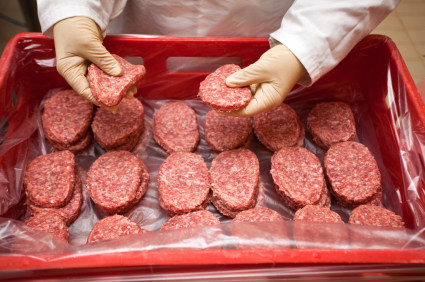 Not-so-total recall: Cargill’s got nearly a million pounds of tainted beef circulating. In Meat Wagon, we round up the latest outrages from the meat and livestock industries.
Not-so-total recall: Cargill’s got nearly a million pounds of tainted beef circulating. In Meat Wagon, we round up the latest outrages from the meat and livestock industries.
———
Remember a couple of weeks ago, when news emerged that a Colorado grocery chain had churned out 466,000 pounds of beef tainted with antibiotic-resistant salmonella, sent it out to six states, and then voluntarily recalled it–but not until weeks after several people had fallen violently ill from it? Well, they must be having some kind of competition out west, because now a California outfit called Beef Packers, owned by Cargill, the globe’s biggest agribusiness concern, has issued an even bigger recall of beef tainted with antibiotic-resistant salmonella–this one involving 825,769 pounds circulating in Arizona, California, Colorado, and Utah.
Now, it’s Meat Wagon tradition to convert such abstract-seeming figures into what we like to call Quarter Pounder Equivalents (QPEs). We already established that the first recall involved enough suspect beef for McDonald’s to crank out approximately 1.86 million Quarter Pounders. According to our proprietary mathematical models, the current recall’s QPE is 3.3 million. Combining the two recalls, there’s enough dodgy beef out there to serve everyone in Los Angeles a Quarter Pounder–with more than a million left over for suburbanites!
But this is really no laughing matter. Here is how USDA descibes the situation in its press release:
This particular strain of Salmonella Newport is resistant to many commonly prescribed drugs, which can increase the risk of hospitalization or possible treatment failure in infected individuals.
Just to be clear, “treatment failure” means, uh, death.
In my post on the earlier recall, I discussed the mounting problem of antibiotic resistance. Something like 70 percent of antibiotics consumed in the United States end up on factory animal farms, to keep animals alive and growing amid cramped, fiithy conditions that destroy their immune systems. There’s a bill floating around the House that restrict prophylactic applications of antibiotics on farms; but as the NYT recently put it, “The farm [read: agribusiness] lobby’s opposition makes its [the bill’s] passage unlikely.” Obama’s FDA has come out in support of restricting antibiotics on livestock farms–but the FDA has little or no authority over livestock feed practices. That task falls to the USDA’s Food Safery and Inspection Service (FSIS), which regulates safety issues for the meat and egg industries.
At Obama FoodoRama, Eddie Gehman Kohan (who alerted me to the current recall with a Twitter post) reminds us that the USDA does not have the authority to impose recalls. This one, like all other meat recalls, is voluntary. Thus “No restaurant, market, etc. is required to turn in their product, or pull it from their shelves,” she writes.
Meanwhile, the Obama administration still hasn’t named an FSIS director–the post has been vacant for months. Last I heard, a Pennsylvania Big Dairy man with no food-safety experience was being seriously considered for the post. Let’s hope the administration finds someone willing to stand up to the meat industry instead.
Whoever takes the job, he or she will certainly be dealing a lot with Cargill, owner of the plant responsible for the latest recall. Cargill is a vast agribusiness comglomerate; it’s largest U.S. grain trader and the majority owner of Mosaic, one if the globe’s biggest fertilizer prodcuers. As for meat and egg production, here’s how Wikipedia describes it.
[Cargill] supplies approximately 22 percent of the United States domestic meat market, exporting more product from Argentina than any other company and is the largest poultry producer in Thailand. All of the eggs used in McDonald’s restaurants in the United States pass through Cargill’s plants.


